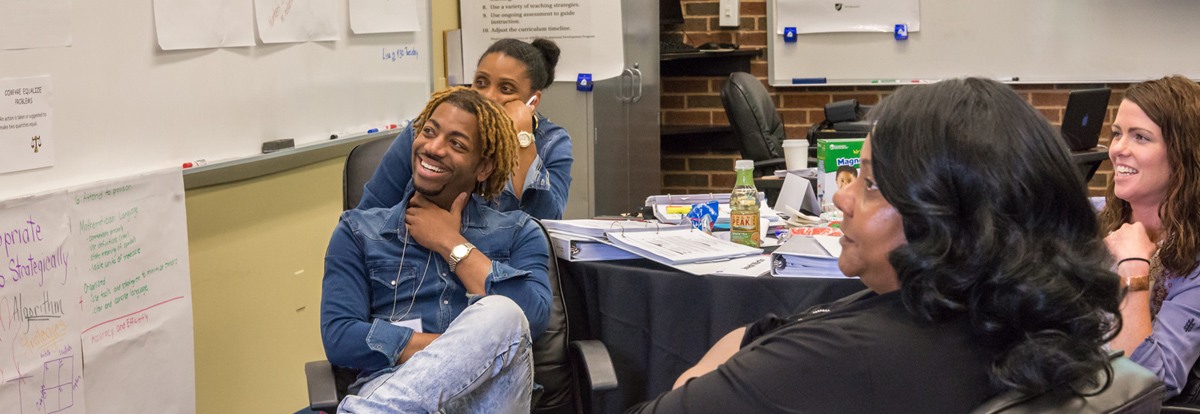Return to the Main Menu

Delivering Effective Professional Development
Note: This is a mini-course required for ALL participants, unless taken at SEA 2017 or later.
This course will assist you in your role as a trainer and coordinator of a local professional development program. You will receive guidelines as to what an effective presenter must know and do (e.g., presentation techniques, planning professional development sessions) and tips on how to succeed with adult learners. You will observe presentation strategies and begin preparation for a practice presentation in your strand.
Participants also will learn how to manage a local AFT Professional Development Program and build local capacity for its growth and expansion.
Accessible Literacy Framework
How does one provide reading instruction to students with developmental or intellectual disabilities such as autism, cerebral palsy or Down syndrome? This course is grounded in the premise that reading is at the center of most activities—in and out of school. The essential components of reading instruction—phonological awareness, sound blending, initial phoneme segmentation, letter-sound correspondence, decoding and shared reading—will be covered and framed to address emerging literacy needs of students with complex communication needs. This course is designed specifically for educators and school staff who are responsible for providing and/or adapting materials for students with disabilities who have complex communication needs, use assistive technology to access curriculum, or require adaptive materials to participate in a learning environment. Course participants will learn specific strategies designed to augment existing curriculums or to serve independently as a literacy tool to reach this academically under served and challenging student population.
English Language Learners 101
The course is designed for K-12 mainstream or general education educators (teachers, paraprofessionals, others) of English language learners who have little to no information or preparation to work with this rapidly growing population of students. There are four sections (modules) that will include research-based information on second-language acquisition; information about the cultural, academic and linguistic diversity of ELLs; and a range of strategies and skills to differentiate instruction for ELLs while maintaining academic rigor.
Foundations of Effective Teaching: Organizing the Classroom Environment for Teaching and Learning
This core course addresses the fundamental aspects of teaching and learning that are relevant for teachers and instructional paraprofessionals in all grade levels and subject areas. It aligns nicely with many of the indicators on state and district wide teacher evaluation rubrics, and is particularly useful for training evaluators and mentor teachers who are responsible for providing support through peer assistance and review as well as induction programs for new teachers. Content in this course is designed to give educators the knowledge and skills needed to prepare students for college and careers. While examining research-based concepts such as creating a positive classroom environment, increasing student engagement, maximizing learning time, interactive instruction and scaffolding techniques, questioning and giving feedback, and using homework to extend learning, participants will reflect upon their own practices and set professional goals for improving their craft to meet students’ needs. Foundations of Effective Teaching I is an essential part of any professional development program.
Informing Instruction using Student Learning Objectives (3-day course)
If your district is using or planning to use a process for measuring student growth that includes selecting an assessment, setting learning goals, and conferencing with the evaluator about student growth—even if the process is not called “student learning objectives” or SLO—then this training will be important to your local/members.
If your district is using an SLO process that your members have been trained to use, this online course is a good way to allow new hires to understand the process or can be used as a refresher for veteran educators. Participants in this workshop will receive the knowledge and resources needed to be able to have an in-depth understanding of each of the components of an SLO and engage in developing one for their own use. Fully understanding the SLO process will give participants the confidence to take control of it and ensure its use as a tool for success in the classroom as well as a way to demonstrate its impact on student learning.
Reading Comprehension Instruction
Reading Comprehension Instruction focuses on the research and exemplary practices that help students acquire strong reading comprehension skills. RCI is appropriate for all K-12 teachers and support staff who need to help increase their students’ comprehension of text—whether that text is a literature selection or informational text. The course provides participants with a synthesis of the research base on reading comprehension instruction and vocabulary development. Participants examine, discuss and evaluate the appropriate application of a range of instructional strategies from explicit to implicit teaching of comprehension skills. Strategies are presented for increasing student comprehension of both narrative and expository texts. In addition, participants learn how to help students self-monitor comprehension and apply appropriate “fix-up” strategies when comprehension is not achieved. Practice in using instructional strategies and examples of student work are embedded in the course.
Strategies for Student Success
This high-quality, research-based professional learning program consists of three hour-long modules that create a manageable way to connect with educators. The SSS modules address teaching and learning in a way that benefits new and veteran teachers alike. The content in the modules can be tailored to benefit individuals, groups and the whole school. SSS approaches professional development and learning from an issues-based perspective. Whether the need is created by policy, mandates, feedback on evaluations or professional inquiry, SSS responds. Content is taught with activities that require reflection on daily practice, debate over research and current practices, utilizing modeling and experiential learning approaches. Engaged discussions augment the relevance of the research-based classroom strategies, and instruction is designed to facilitate immediate use.
SSS Modules offered at SEA 2019:
- Setting Measurable Objectives
- Is My Teaching Effective?
- Tools for Teachers from Brain Researchers
- Teach Them to Think
- Activating Learning in All Disciplines
Thinking Mathematics 6-8
The middle school course is redesigned to allow teachers to reflect on and connect the Mathematics Standards to research on how students learn mathematics. The Ten Principles of Thinking Math and the Standards for Mathematical Practice are linked and attention paid to how concepts and skills develop. Using geometry as a starting point, participants explore ways to help students understand linear functions and rate of change with emphasis on linking various ways of seeing the same problem. Practices such as reasoning, constructing viable arguments, precision and looking for mathematical structure combine with the Ten Principles of Thinking Mathematics such as helping students visualize problems, requiring them to discuss and justify their mathematical thinking, using situational problems to connect mathematics to life, and balancing conceptual and procedural knowledge to develop such understanding.
Course Cancellation
If we are unable to offer a course due to low enrollment or other reasons, the AFT will notify participants as soon as possible. Registrants will have the opportunity to select another course.
